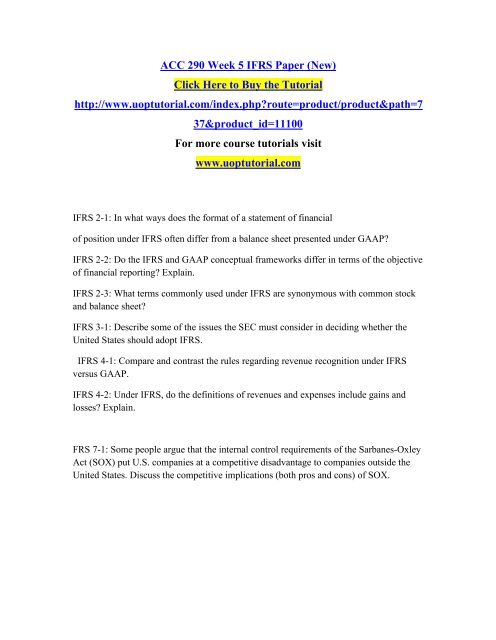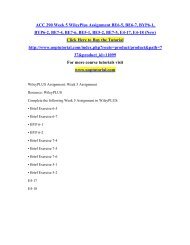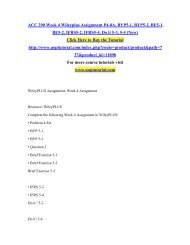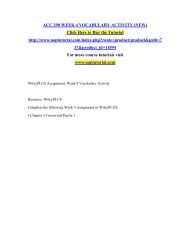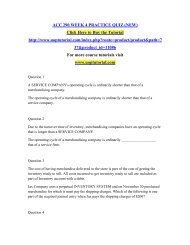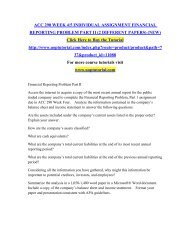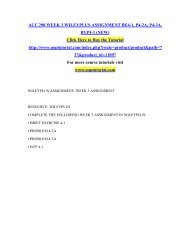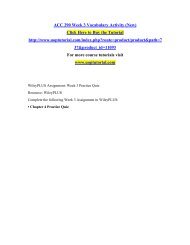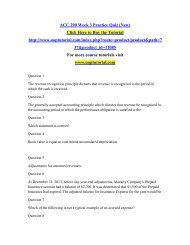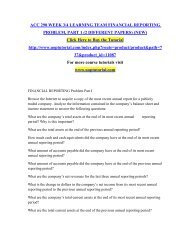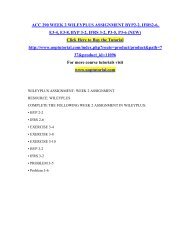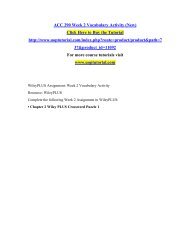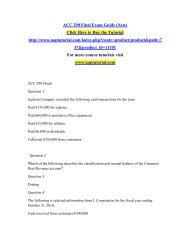ACC 290 Week 5 IFRS Paper (New)/Uoptutorial
IFRS 2-1: In what ways does the format of a statement of financial of position under IFRS often differ from a balance sheet presented under GAAP? IFRS 2-2: Do the IFRS and GAAP conceptual frameworks differ in terms of the objective of financial reporting? Explain. IFRS 2-3: What terms commonly used under IFRS are synonymous with common stock and balance sheet? IFRS 3-1: Describe some of the issues the SEC must consider in deciding whether the United States should adopt IFRS. IFRS 4-1: Compare and contrast the rules regarding revenue recognition under IFRS versus GAAP. IFRS 4-2: Under IFRS, do the definitions of revenues and expenses include gains and losses? Explain. FRS 7-1: Some people argue that the internal control requirements of the Sarbanes-Oxley Act (SOX) put U.S. companies at a competitive disadvantage to companies outside the United States. Discuss the competitive implications (both pros and cons) of SOX.
IFRS 2-1: In what ways does the format of a statement of financial
of position under IFRS often differ from a balance sheet presented under GAAP?
IFRS 2-2: Do the IFRS and GAAP conceptual frameworks differ in terms of the objective of financial reporting? Explain.
IFRS 2-3: What terms commonly used under IFRS are synonymous with common stock and balance sheet?
IFRS 3-1: Describe some of the issues the SEC must consider in deciding whether the United States should adopt IFRS.
IFRS 4-1: Compare and contrast the rules regarding revenue recognition under IFRS versus GAAP.
IFRS 4-2: Under IFRS, do the definitions of revenues and expenses include gains and losses? Explain.
FRS 7-1: Some people argue that the internal control requirements of the Sarbanes-Oxley Act (SOX) put U.S. companies at a competitive disadvantage to companies outside the United States. Discuss the competitive implications (both pros and cons) of SOX.
- No tags were found...
You also want an ePaper? Increase the reach of your titles
YUMPU automatically turns print PDFs into web optimized ePapers that Google loves.
<strong>ACC</strong> <strong>290</strong> <strong>Week</strong> 5 <strong>IFRS</strong> <strong>Paper</strong> (<strong>New</strong>)<br />
Click Here to Buy the Tutorial<br />
http://www.uoptutorial.com/index.php?route=product/product&path=7<br />
37&product_id=11100<br />
For more course tutorials visit<br />
www.uoptutorial.com<br />
<strong>IFRS</strong> 2-1: In what ways does the format of a statement of financial<br />
of position under <strong>IFRS</strong> often differ from a balance sheet presented under GAAP?<br />
<strong>IFRS</strong> 2-2: Do the <strong>IFRS</strong> and GAAP conceptual frameworks differ in terms of the objective<br />
of financial reporting? Explain.<br />
<strong>IFRS</strong> 2-3: What terms commonly used under <strong>IFRS</strong> are synonymous with common stock<br />
and balance sheet?<br />
<strong>IFRS</strong> 3-1: Describe some of the issues the SEC must consider in deciding whether the<br />
United States should adopt <strong>IFRS</strong>.<br />
<strong>IFRS</strong> 4-1: Compare and contrast the rules regarding revenue recognition under <strong>IFRS</strong><br />
versus GAAP.<br />
<strong>IFRS</strong> 4-2: Under <strong>IFRS</strong>, do the definitions of revenues and expenses include gains and<br />
losses? Explain.<br />
FRS 7-1: Some people argue that the internal control requirements of the Sarbanes-Oxley<br />
Act (SOX) put U.S. companies at a competitive disadvantage to companies outside the<br />
United States. Discuss the competitive implications (both pros and cons) of SOX.


